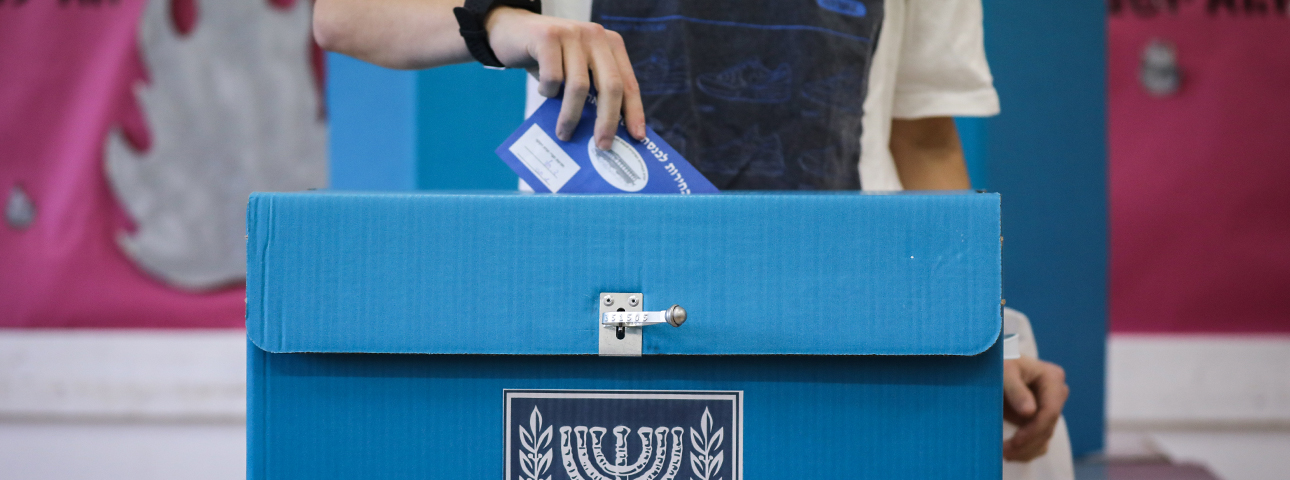Celebrating Voter’s Day
Voter’s Day, between vicious campaigning and brutal coalition cobbling, lets us appreciate the great equalizer of 'one person, one vote'

Flash 90
The last few months have clearly demonstrated that achieving democracy is a painful process. We’re nearing the finish line, exhausted and aching. We’ve bared our claws, shamelessly vilified our opponents, made outrageous assertions, and not shied away from telling brazen lies. We made promises we knew we couldn’t keep and did precisely the opposite of what we promised. We squeezed the last drop of venom from our poison glands, and then spurted some more.
The long months of pregnancy leading up to Election Day have brought with them a queasy feeling bordering on severe nausea. The old curse, “in pain you will give birth (to Knesset members),” is being realized with compound interest. But now, the day has finally arrived, and the ballots will soon be counted. It’s a great day—Voter’s Day—and we should pause to contemplate it. Like the calm in the eye of a hurricane that wreaks havoc, Voter’s Day is a short break of relative quiet that separates the tempest of the campaign from the stormy efforts to assemble a government coalition.
We Israelis have much cause for celebration on Voter’s Day. It provides us with an opportunity to take a breather from the agonies before and after, and to take comfort in the series of miracles that are associated with the day.
First of all—there’s a festival of equality. Human equality is an important goal that civilized societies must strive to achieve. Alas, in daily life, the attempt to reach this goal runs up against many difficulties, because the real world is marked by chronic inequality between the fools and the wise, the beautiful and the homely, men and women, prisoners and those at liberty, persons with physical or mental disabilities and those of sound mind and body. But behold the miracle! On Voter’s Day these differences become invisible. Voting is a universal right, and everyone’s vote has equal weight—the tycoon and the beggar, the genius and the intellectually challenged, the soldier and the draft dodger, the loyal citizen and the traitor. Exceptionally, and contrary to intuition, each and every one of us has equal input in the most important decision of public life: who will lead the country. And this is genuine cause for celebration.
Second: political participation. In a rational world, why should we all bother to go and vote? A single vote—yours or mine—is inconsequential, in the total of six million or so who go to the polls; a simple economic analysis demonstrates that standing in line to get to the voting booth isn’t worthwhile. The benefit of voting for the individual is negligible, so even those with strong preferences on political issues might as well let others do the work for them. We can make the rational choice of apathy and go spend the day at the beach. In fact, however, the overwhelming majority is not indifferent: in the last general election, voter turnout exceeded 80%. Millions of Israeli citizens act in a way that seems irrational and accept the rather nebulous burden of “civic duty.” Clearly, we care deeply, in a way that overrides cost-benefit considerations. Israel is our home, and we are deeply concerned about how it is run. Most of us exercise our right to share responsibility for our common destiny, out of a profound concern for Israeli society and the Israeli state. This too is cause for celebration.
Third: trust in the system. Israeli society is locked in the throes of a culture war. The opposing sides disagree on just about everything—ideology, identity, religious belief, Israel’s vision, and of course—concrete interests. The fabric of a shared society is stretched to its limits. The collective experience is of a zero-sum game: one side’s success is necessarily the other side’s failure, and even defeat. So our passions rage, all restraints are tossed away, and we give free rein to our tongue. But, once again, behold the miracle: even though our democracy is in crisis, our overall confidence in the democratic system, as embodied in the rules for making national decisions, survives. There are allegations of corruption and abuse of power, but everyone expresses a fundamental commitment to play by the rules. Today, as in the past, and despite the growing heat of the culture war, if the ballot count ends up with a change of government, no one will think of taking to the streets to prevent the change. Another cause for celebration.
The Israeli calendar does not include even one day off shared by all segments of the population. We have many Jewish and Zionist holidays, but we do not have a civil holiday. Election Day, once every few years, could be such a day, in which we will all be proud of our commitment to democracy. In order for such a rare celebration to take place, politicians and activists, who are competing in these elections, must restrain themselves on the voter`s day. There is no certainty that this will happen: As we recall, in 2015, Election Day was marred by incitement. This must not be repeated. There are still twists and turns on the yellow-brick road that will lead one of the contestants to the Prime Minister’s house on Balfour Street. But today, each of them must respect the civic sanctity of voter’s day and allow all of us to bask in the unique and rare sunlight of a pan-Israeli moment.
This article was first published in the Times of Israel.
